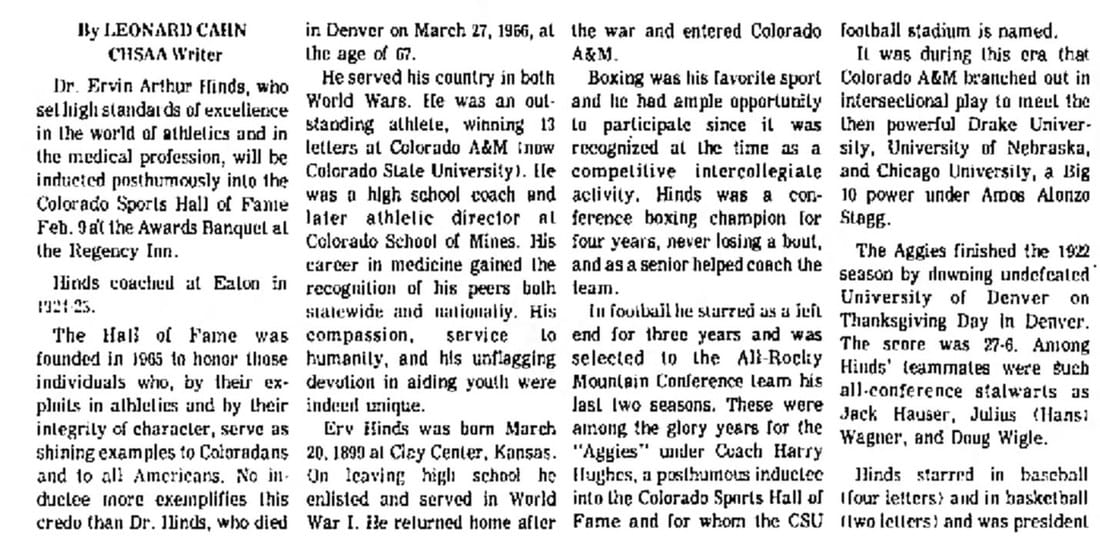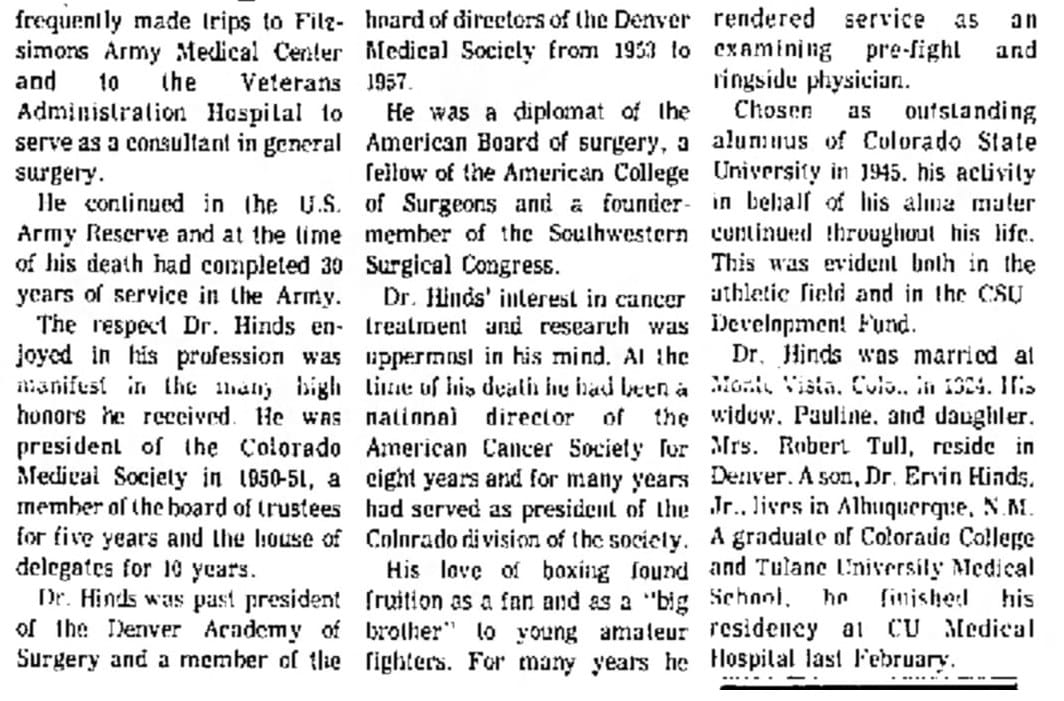Rocky Mountain Collegian
May 23, 1928
by Glen Langley
Alumni Athletes Association
The following is an article that was published verbatim in the May 23, 1928 issue of the Rocky Mountain Collegian. The article was written by Glen Langley and recently uncovered by Gordon Hazard, a retired CSU professor.
Whether sawing a medal in two and giving half of it to one's opponent, whether earning thirteen letters and a numeral in athletics, whether holding a conference championship for three consecutive years, and whether being dubbed "Two Round Hinds" is a record any Aggie can make, we are not prepared to say, but the unexcelled record made by Ervin Hinds, 25, is still vivid in the minds of present day Aggies.
Ervin Hinds and Phillip Wade were the first men to leave Brighton for the World War. Wade was drowned, but Hinds succeeded in only being gassed twice in two years service and eight months at the front. In the service, Hinds learned that a higher education was necessary. After being discharged, he was urged by a good Aggie friend, Dennis Merril, to go to Aggies.
The fall of 1919 found Hinds a bona fide freshman. He was doomed to be a great college athlete. In order to get his lungs cleared of gas, he went out for boxing. He was victorious in most of his matches, staging a knockout in most every match. His first was with a man from Mines. Once a near mob fight resulted when the referee gave the decision to a man Hinds had knocked out.
Hinds had held the 158 lb. championship for three years and he was anxious to hold it for the next year. He was so anxious to win the last match that he over trained and his legs went numb in the fight. Volk, his opponent from Mines, was given the decision, but after the decision, one of the judges protested that he had voted wrong. The referee called the match a draw and wanted another round. Volk's trainer would not consent. Hinds got the decision and the medal. Later he sawed the medal in half and sent half to Volk. Volk is now freshman coach and wrestling coach at Mines. Hinds had 16 fights in his school career, 12 of which were won by knockout in the second round. We can easily see the justification for the title "Two Round Hinds".
Hinds was quite prominent in other athletics. He won four letters in baseball, three in football, two in basketball and also four in boxing. He was captain of the boxing squad for two years as well as coaching in that sport. He was made all conference end in football his senior year.
In his senior year, Hinds was made a member of the student council and was in the faculty take-off. In his senior year, he was senior body president and president of the A Club. In his senior year, he was one of the committee that met with the Board of Agriculture and faculty to get a new gymnasium. Hinds was nearly ousted from the institution because he got his Irish up and left the room when the Board of Agriculture inferred that the committee was like a bunch of children wanting a new toy. It must have had the effect, tho, because the following year plans were drawn up for a new gymnasium.
Hinds graduated with a B.S. degree in A.H. in 1923. Not only did he make a success of his career in school but success has followed him since. He taught in the high schools at Yuma and Eaton and frequently put out winning teams in athletics and stock judging. At present he is director of athletics at the School of Mines
The following is an article that was published verbatim in the May 23, 1928 issue of the Rocky Mountain Collegian. The article was written by Glen Langley and recently uncovered by Gordon Hazard, a retired CSU professor.
Whether sawing a medal in two and giving half of it to one's opponent, whether earning thirteen letters and a numeral in athletics, whether holding a conference championship for three consecutive years, and whether being dubbed "Two Round Hinds" is a record any Aggie can make, we are not prepared to say, but the unexcelled record made by Ervin Hinds, 25, is still vivid in the minds of present day Aggies.
Ervin Hinds and Phillip Wade were the first men to leave Brighton for the World War. Wade was drowned, but Hinds succeeded in only being gassed twice in two years service and eight months at the front. In the service, Hinds learned that a higher education was necessary. After being discharged, he was urged by a good Aggie friend, Dennis Merril, to go to Aggies.
The fall of 1919 found Hinds a bona fide freshman. He was doomed to be a great college athlete. In order to get his lungs cleared of gas, he went out for boxing. He was victorious in most of his matches, staging a knockout in most every match. His first was with a man from Mines. Once a near mob fight resulted when the referee gave the decision to a man Hinds had knocked out.
Hinds had held the 158 lb. championship for three years and he was anxious to hold it for the next year. He was so anxious to win the last match that he over trained and his legs went numb in the fight. Volk, his opponent from Mines, was given the decision, but after the decision, one of the judges protested that he had voted wrong. The referee called the match a draw and wanted another round. Volk's trainer would not consent. Hinds got the decision and the medal. Later he sawed the medal in half and sent half to Volk. Volk is now freshman coach and wrestling coach at Mines. Hinds had 16 fights in his school career, 12 of which were won by knockout in the second round. We can easily see the justification for the title "Two Round Hinds".
Hinds was quite prominent in other athletics. He won four letters in baseball, three in football, two in basketball and also four in boxing. He was captain of the boxing squad for two years as well as coaching in that sport. He was made all conference end in football his senior year.
In his senior year, Hinds was made a member of the student council and was in the faculty take-off. In his senior year, he was senior body president and president of the A Club. In his senior year, he was one of the committee that met with the Board of Agriculture and faculty to get a new gymnasium. Hinds was nearly ousted from the institution because he got his Irish up and left the room when the Board of Agriculture inferred that the committee was like a bunch of children wanting a new toy. It must have had the effect, tho, because the following year plans were drawn up for a new gymnasium.
Hinds graduated with a B.S. degree in A.H. in 1923. Not only did he make a success of his career in school but success has followed him since. He taught in the high schools at Yuma and Eaton and frequently put out winning teams in athletics and stock judging. At present he is director of athletics at the School of Mines



